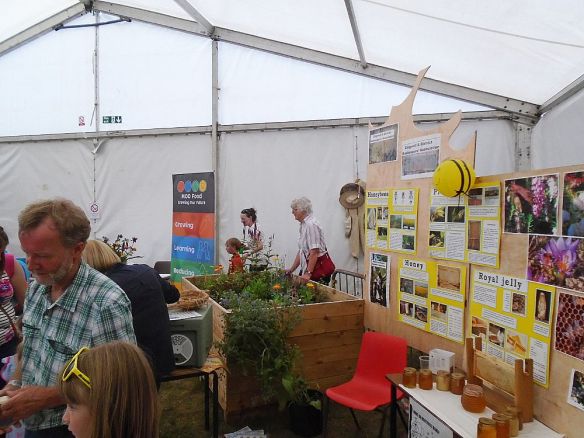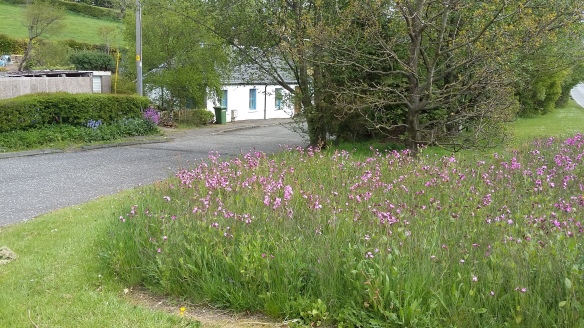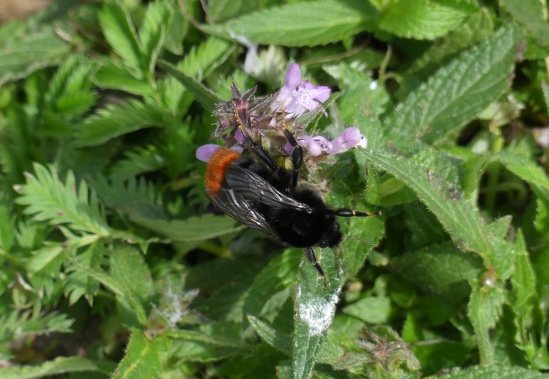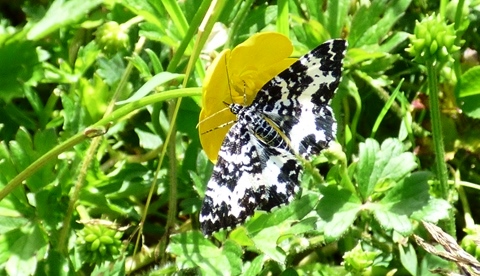Scotland’s pollinating insects include a range of bees and flies, as well as moths, butterflies, wasps and beetles. There are many things we can do to help our native pollinator populations. Making Scotland more pollinator-friendly, raising awareness of their importance, encouraging action across sectors associated with pollinators, and monitoring and evaluating our pollinator populations will all help.
We can group these pollinators into two distinct categories – wild and managed. Our most recognisable wild pollinators are bumblebees. The bumblebee takes nectar from flowers for food, and gathers pollen for their larvae. In doing so it acts as a most effective pollinator.

However, solitary bees are also efficient pollinators and increasingly the role of hoverflies is attracting attention. You are most likely to see hoverflies on what are known as ‘open’ flowers where no particular mouth parts are required to access nectar or pollen.

Hoverflies have an additional benefit in that as well as feeding on both nectar and pollen they will supplement their diet with a host of aphids and other pests.
When we talk about ‘managed pollinators’ we are usually referring to honey bees. Managed pollinators rely on humans, and in the case of the honey bee their relationship with humans is a long standing one – most notably based around the production of honey. Bumblebees are far less frequently used as a commercial pollinator but in recent years colonies have been imported to pollinate strawberries and tomatoes grown in controlled environments such as greenhouses and polytunnels.

In Europe it is estimated that 84% of our 264 crop species are pollinated by insects. In Scotland it is reckoned that insect pollinators contribute around £43 million to the Scottish economy and that 80% of our wildflowers rely on insect pollination.
What is pollination?
Pollination is simply the transfer of pollen from one flower to another to fertilise it. This fertilization enables plants to produce fruit and viable seeds. Without pollination plants cannot reproduce, therefore this process plays a vital role in nature.
Pollination usually relies on either the wind or an animal to transfer the pollen from flower to flower and most plants rely on insects for pollination.
Pollination is a crucial service for Scotland’s natural environment and healthy ecosystems. Pollinators are a vital part of our biodiversity, and pollinators at work in our countryside, parks and gardens increase our enjoyment of the outdoors. Our ‘Natural Health Service’ is increasingly valued for the physical and mental wellbeing it encourages.
Our pollinators also support the Scottish economy by contributing to our food and farming industries. Many of Scotland’s agricultural crops are reliant on pollinators; the list includes oilseed rape, strawberries, raspberries, apples and beans.
Why do pollinators need our help?
Having established that pollinators are critical to the function of our natural environment, it may seem surprising that they need our help. After all, if we lose the pollination service provided by insects we risk impacting on our animals, plants and landscapes as well as seeing our agricultural yields diminished.
Pollinators have been with us for millions of years but today they face a range of threats including land-use change, habitat loss and fragmentation, pollution, diseases, climate change, and pesticides.
What can you do to help our pollinators?
You could do something as simple as managing your garden with pollinators in mind. You could do this by taking advantage of the information freely available on how to encourage pollinators and how to provide food and shelter for them. A range of plants are well known to attract pollinators and there are several websites that host this kind of information.

Groups like Buglife organise pollinator identification courses which are a great way to get out an enjoy nature whilst improving your knowledge
You might consider working with others in helping our pollinators by joining a group like Bumblebee Conservation Trust, Buglife, or Butterfly Conservation to support their campaigns to help pollinators.











 Tackling roadside verges is also an opportunity to deliver improvements in the air quality of our district. Air quality is something which is very much in the news these days. We have worked with Environmental Health colleagues to improve Air Quality in Bearsden through trapping Particulate Matter (PM10) in our wildflower meadows and to date this has taken the form of 1,000 square metres of land being improved and there are plans to double that amount in the coming years.
Tackling roadside verges is also an opportunity to deliver improvements in the air quality of our district. Air quality is something which is very much in the news these days. We have worked with Environmental Health colleagues to improve Air Quality in Bearsden through trapping Particulate Matter (PM10) in our wildflower meadows and to date this has taken the form of 1,000 square metres of land being improved and there are plans to double that amount in the coming years. Being proactive is the key to making a sustainable impact and whilst we are not resting on our laurels we think we have some good news stories in East Dunbartonshire to celebrate, and we will be looking for more of the same in the coming years. That’s good for everyone living in the area and great for our pollinators.
Being proactive is the key to making a sustainable impact and whilst we are not resting on our laurels we think we have some good news stories in East Dunbartonshire to celebrate, and we will be looking for more of the same in the coming years. That’s good for everyone living in the area and great for our pollinators.












